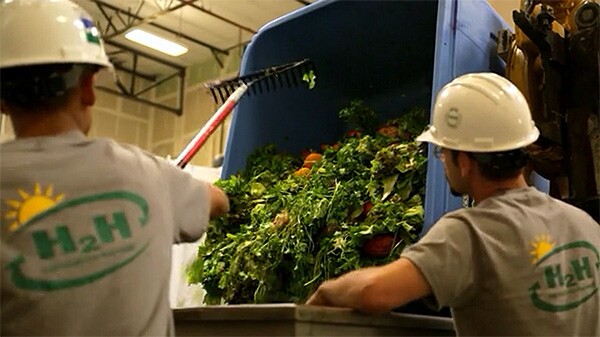California Startup Converts Food Waste Into Fertilizer in Just 3 Hours

Food waste is a hot topic these days, and we hear a lot of different figures from different sources: One says up to half of the world's food is thrown away, equating to two billion tons of food per year. Another approaches it from a different angle: 141 trillion calories are wasted away each year in the U.S. And yet another reveals that nearly $100,000 worth of food is trashedeach day in the L.A. Unified School District.
Which begs the question: where does all this food go?
The answer, for the most part, is landfills. Food waste from residences and businesses alike makes its way to our landfills, where it rots and generates greenhouse gases.
A smaller portion is composted in people's homes and municipal facilities, but even with all the steps we as individuals can take to reduce our waste (by composting, getting wiser to expiration dates, limiting what we buy and how we store it, using up discarded parts of meats and produce, and even dumpster diving), the huge volume of waste on an institutional level is a more troubling environmental concern.
That's where California Safe Soil (CSS) steps in. The startup collects organic waste from its partner supermarkets, transports it in special bins to keep it fresh, then converts the waste into liquid fertilizer through aerobic digestion. The process is similar to traditional composting, only accelerated — think three hours instead of three months. Disposed produce, seafood, meat, cakes, and bread from Northern California-based stores like Save Mart, Safeway, and Whole Foods Market are upcycled into a pathogen-free fertilizer.
"Think of the human digestive system," founder Dan Morash told The Guardian. "We use mechanical action to reduce the size of the particles, like chewing. We heat the material and add enzymes, like in your stomach. The proteins become amino acids. The fats become fatty acids. And the carbs become simple sugars. Those are the nutrients that circulate in your blood stream and nourish your body."
The nutrients, which come in the form of CSS' flagship fertilizer called Harvest-to-Harvest, are also beneficial to plants. Currently the fertilizer is only available to farmers, but a home garden version is in the works.
The program is still in pilot phase with field trials at various farms, but recently it announced Patagonia Works as a new investor.